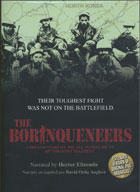
The Borinqueneers: A Documentary on the All-Puerto Rican 65th Infantry Regiment 2007
Distributed by Cinema Guild, 115 West 30th Street, Suite 800, New York, NY 10001; 212-685-6242
Produced by Noemi Figueroa Soulet and Raquel Ortiz
Directed by Noemi Figueroa Soulet and Raquel Ortiz
DVD, color, b&w archival footage, 78 min. main feature, 35 min. deleted scenes
Sr. High - Adult
History, Latin American Studies, Military Studies
Date Entered: 12/23/2008
Reviewed by Jeremy Linden, Head of Archives and Special Collections, Daniel A. Reed Library, State University of New York College at Fredonia, Fredonia, NYBorn from the native, volunteer militia created in Puerto Rico after the Spanish-American War, and formalized in 1920, the 65th Infantry Regiment, nicknamed “The Borinqueneers,” was the only Hispanic segregated unit in United States Army history. Having served with distinction in World War I, World War II, and the Korean War, the 65th, decorated in battle, unique in its history, and a source of pride in Puerto Rico, was integrated 1953 after a series of high-profile court-martials. By 1956, the unit was deactivated from the regular Army and transferred to the Puerto Rico National Guard. The Borinqueneers traces this story, from the height of the unit’s success to the controversy of its downfall, exploring the camaraderie of its troops and the pride in its tradition – at once both its greatest asset and perhaps, ultimately, the source of its demise.
The documentary follows the 65th throughout its history, but concentrates its efforts on the roughly three years between 1950 and 1953. The unit initially gained recognition during exercises between World War II and the Korean War; as one of the first infantry units dispatched to Korea, they saw action during the northward push, and were a part of the contingent which covered the retreat of United States Marines from the Battle of Chosin Reservoir. The film examines their success in these actions, calling attention to their solidarity as a unit from a common culture and home, and highlights the unique leadership structure: Spanish-speaking troops, typically “continental” (white) commanders, with a mixture of continental and Puerto Rican bilingual non-commissioned officers (NCOs). The Borinqueneers argues that this cohesiveness suffered, even more than was typical, as the 65th was decimated by casualties and saw numbers of new recruits, continental Puerto Ricans, and non-Spanish-speaking officers and NCOs rotated into a unit that had served together since World War II. It was this challenge, and the difficulty of defending positions at Kelly Outpost and Jackson Heights, that led to the refusal by a number of soldiers to continue fighting. The resulting mass court-martial was the largest of the Korean War. Though the men were pardoned shortly thereafter, the accusations were protested by Puerto Rico, and arguably led to the desegregation of the unit.
The Borinqueneers, which successfully illuminates not only the significant actions of Puerto Rican soldiers during the Korean War, but also the evolving desegregation policies of the United States Army, is highly recommended for its insightful treatment of the contribution of the 65th Infantry Regiment to American military efforts throughout the early 20th century. Modern interviews of veterans are interspersed with the insight of military and academic historians; the wealth of archival footage and still images is impressive and significant. The film, sensitive to the plight of the 65th and its veterans, while remaining cautiously objective, should be considered required content for any collection or institution supporting a Puerto Rican population or Latin American studies. As sheer military history, it is invaluable in its depiction of a seldom dealt with topic – the service of Latin Americans, in this case Puerto Ricans, in American history. As a human study, the dedication of these men to their unit and one another is palpable; the results of the developing policy of desegregation, assumed beneficial, become complex as the viewer considers the unique story of the Borinqueneers.
This DVD includes both English and Spanish versions on the same disc, and includes approximately 30 minutes of additional interview footage not included in the final film. The film’s website, includes additional educational content, including short historical pieces and teaching aids.
Awards
- Winner, Award of Excellence, Accolade Television Awards, 2008
- Winner, Best Puerto Rican Documentary, Rincon International Film Festival, 2008
- Winner, Best Professional Documentary, Real to Reel International Film Festival, 2008
- Honorable Mention, Chris Awards, 2008
- Nominee, Best Documentary for Television, Imagen Awards, 2008
- Finalist, Estela Award, National Association of Latino Independent Producers, 2008